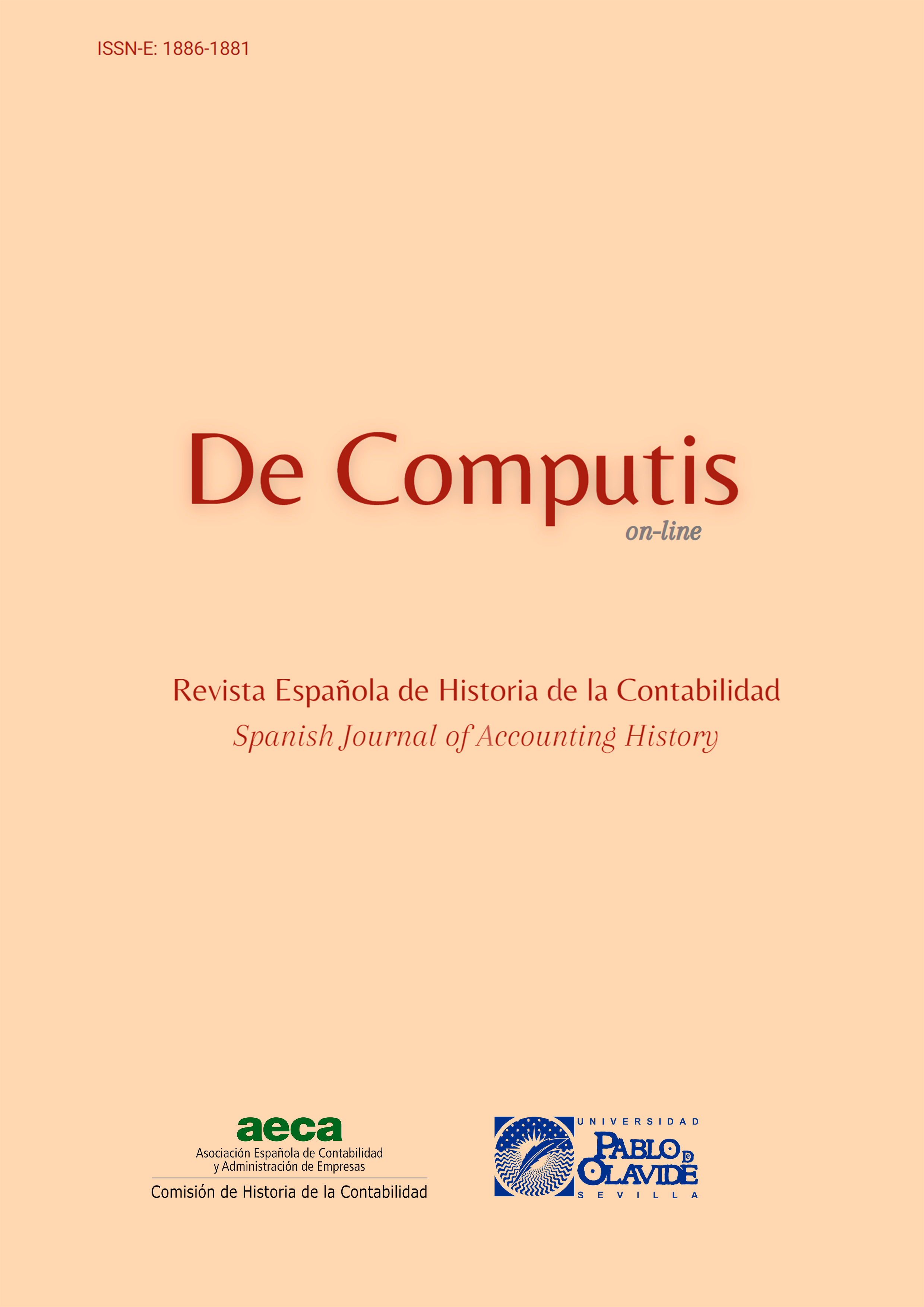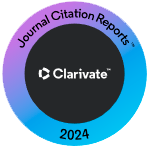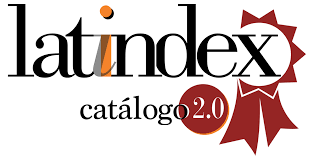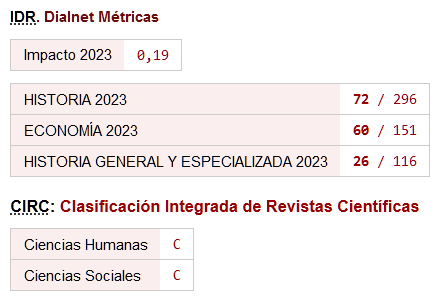The military interventionism in the narrative reporting
The Foundry Workshop ‘Gabilondo’ (Valladolid, 1927-1959)
DOI:
https://doi.org/10.26784/issn.1886-1881.19.2.7492Keywords:
Attributional bias, Legitimation, Earnings, annual reports, military intervention, Valladolid, Foundry Workshop GabilondoAbstract
In the middle of nineteenth century, the metal industry of Valladolid underwent a significant development due to its strategic location; in 1860 ‘Talleres de Fundición Gabilondo’ (a foundry workshop), whose case is studied in this paper, was founded. The foundry workshops were military intervened for arms production during the Spanish Civil War. This work analyses the narratives of the company from the attributional bias. The results show that the expected positive attributions to the managers are transferred to the ‘Glorious Army’ and ‘Caudillo Franco’ during the period 1936-39. In certain contexts, the narratives are used for attributing positive results to external factors, legitimating ideologies, or behaviors.
Downloads
References
Abdelrehim, N., Maltby, J. & Toms, S. (2014). Narrative reporting and crises: British Petroleum and Shell, 1950-1958. Accounting History, 20(2), 138-57. https://doi.org/10.1177/1032373214563323
Aerts, W. (2005). Picking up the pieces: impression management in the retrospective attributional framing of accounting outcomes. Accounting, Organizations and Society, 30, 493-517. https://doi.org/10.1016/j.aos.2004.07.001
Álvarez Martín, M.M. (2007). La industria fabril en Castilla y León durante el primer franquismo (1939-1959). Valladolid, Ed. Universidad de Valladolid.
Álvarez Martín, M.M. & Ortúñez Goicolea, P.P. (2009). La formación de un distrito metalúrgico en Valladolid (c. 1842-c. 1953). Asociación Española de Historia Económica, Documentos de trabajo. https://www.aehe.es/wp-content/uploads/2015/04/dt-aehe-09061.pdf
Álvarez Martín, M.M. & Ortúñez Goicolea, P.P. (2010). La Mirada del Ejército sobre la Industria: Los Sectores Eléctrico y Químico en la España de Entreguerras. Anales de Estudios Económicos y Empresariales, 20, 185-212. https://dialnet.unirioja.es/descarga/articulo/3763144.pdf
Brennan, N. & Merkl-Davies, D. (2013). Accounting narratives and impression management. In: The Routledge Companion to Communication in Accounting. London: Routledge, 109–32.
Burchell, S., Clubb, C., Hopwood, A. & Hughes, J. & Nahapiet, J. (1980). The roles of accounting in organizations and society. Accounting, Organizations and Society, 5(1), 5-27. https://doi.org/10.1016/0361-3682(80)90017-3
Cayón, F. (1999). “La industria de construcción de material ferroviario: estructura y evolución (1848-1997)”. En Vidal Olivares, Muñoz Rubio y Sanz Fernández (eds.): Siglo y medio del ferrocarril en España, 1848 - 1998: economía, industria y sociedad. Ed. Instituto Alicantino Juan Gil-Albert, 787-808.
Cayón, F., González, R. & Muñoz Rubio, M. (1998). El Camino del Tren. 150 años de infraestructura ferroviaria. Madrid, Ed. RENFE y FFE.
Cayón, F. & Muñoz Rubio, M. (1998). La industria de construcción de material ferroviario. Una aproximación histórica. Madrid, Ed. Fundación Empresa Pública. https://www.fundacionsepi.es/investigacion/publicaciones/DocumentosTrabajo/PHE/hdt1998_3.pdf
Claworthy, M.A. & Jones, M.J. (2006). Differential patterns of textual characteristics and company performance in the chairman’s statement. Accounting, Auditing &
Accountability Journal, 19(4), 493-511. 10.1108/09513570610679100
Cobbin, P. E. & Burrows, G. H. (2018). The profession of arms and the profession of accounting numbers – Accounting, the military and war: A review. Accounting History, 23(4), 487-520. https://doi.org/10.1177/1032373218779188
Fernández-Revuelta, L., Gómez, D. & Robson, K. (2002). Fuerzas Motrices del Valle de Lecrín, 1936-9: accounting reports and ideological struggles in time of civil war. Accounting, Business & Financial History, 12(2), 347-366. https://doi.org/10.1080/09585200210134974
Gabilondo Santander, I. (2012). Leto Gabilondo: un vallisoletano ilustre. Edición del Autor, 88 pp. Biblioteca del Archivo Municipal de Valladolid, ref. C.217-25.
Gómez Mendoza, A. (1978). “Los ferrocarriles y la industria siderúrgica”. En Los ferrocarriles y el desarrollo económico de Europa Occidental durante el siglo XIX. Madrid, Ed. Renfe, 129-146.
Gómez Mendoza, A. (1981). “Los ferrocarriles y la industria siderúrgica, 1855-1913”. En Los ferrocarriles y el desarrollo económico de Europa Occidental durante el siglo XIX. Madrid, Ed. Renfe, 129-146.
Gómez Mendoza, A. (1985). La industria del material ferroviario, 1844-1935. Madrid, Banco de España.
Lalana Soto, J.L. (2003). Los talleres ferroviarios de Valladolid: del siglo XIX al XXI. En Actas del III Congreso de Historia Ferroviaria: Siglo y medio del ferrocarril en Asturias, Gijón. https://www.docutren.com/HistoriaFerroviaria/Gijon2003/pdf/te4.pdf
Li, F. (2008). Annual report readability, current earnings, and earnings persistence. Journal of Accounitng & Economics, 45, 221-247. https://doi.org/10.1016/j.jacceco.2008.02.003
Moreno, A., Jones, M.J. & Quinn, M. (2019). A longitudinal study of the textual characteristics in the chairman’s statements of Guinness: An impression management perspective. Accounting, Auditing & Accountability, 32(6), 1741-1741. https://doi.org/10.1108/AAAJ-01-2018-3308
Ogden, S. & Clarke, J. (2005). Customer disclosures, impression management and the construction of legitimacy: Corporate reports in the UK privatised water industry. Accounting, Auditing & Accountability, 18(3), 313-345. https://doi.org/10.1108/09513570510600729
Pérez Sánchez, G.A. (1992). Los Talleres Principales de Reparación de la Compañía del Norte en Valladolid: un estudio de la historia social (1861-1931). Revista de Investigaciones Históricas: época moderna y contemporánea, 12, 255-284. https://dialnet.unirioja.es/descarga/articulo/66339.pdf
Real Academia de la Historia (2019). José Antonio González-Regueral y Jové. Recuperado de http://dbe.rah.es/biografias/63282/jose-antonio-gonzalez-regueral-y-jove
Rutherford, B.A. (2003). Obfuscation, textual complexity and the role of regulated narrative accountijng disclosure in corporate governance. Journal of management and governance, 7(2), 187-210. https://link.springer.com/article/10.1023/A:1023647615279
Salancik, G.R. & Meindl, J.R. (1984). Corporate Attributions as Strategic Illusions of Management Control. Administrative Science Quarterly, 29(2), 238-254. https://www.jstor.org/stable/2393176
Sancho Sora, A. (2000). Especialización flexible y empresa familiar: la Fundición Averly de Zaragoza (1863-1930). Revista de Historia Industrial, 17, 61-95. https://raco.cat/index.php/HistoriaIndustrial/article/view/63361
Suchman, M.C. (1995). “Managing legitimacy: strategies and institutional approaches”, Academy of Management Review, 20(3), 571-610. https://doi.org/10.2307/258788
Vidal Olivares, J. (1999). La estructura de la propiedad, la organización y la gestión de una empresa ferroviaria: la Compañía de los Caminos de Hierro del Norte de España, 1858-1936. Revista de Historia Económica, 3, 623-662. http://hdl.handle.net/10016/2085
VVAA (1985). Valladolid en el S. XIX. Historia de Valladolid, tomo VI.
Wais, F. (1974). Historia de los ferrocarriles españoles. Madrid, Ed. Editora Nacional.
Downloads
Published
How to Cite
Issue
Section
License
Copyright (c) 2022 Beatriz Santos-Cabalgante, Leandro Cañibano Calvo

This work is licensed under a Creative Commons Attribution-NonCommercial-ShareAlike 4.0 International License.










